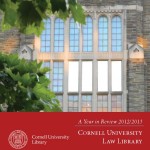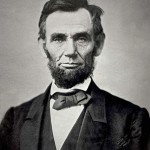
Many people have their version of the White Whale, that thing they chase but can’t quite acquire or overcome.
For 3L Peter Cavallaro it came in form of Pope Benedict XVI. Well, not the man so much as his signature and the acquisition of it.
“It was very difficult” he said. “I wasn’t able to get it until about a month-and-a-half ago.”
It’s no surprise that Cavallaro would eventually track it down as he is an avid collector of autographs with over 300 hundred signatures from a variety of famous people. Replicas of a portion of his collection are currently on display in the Reading Room featuring figures from the last 50 years of American political and civil rights history. The autographed photos range from civil rights activist James Meredith to astronaut John Glenn and from Jimmy Carter to George W. Bush.
Cavallaro said he’s been collecting over the last decade, some in person and some by mail. Regardless of method, he said the process is not unlike law school in that it requires research, planning and persistence in order to achieve success.
“The challenge is doing the research and looking for the right contact,” he said.”Ninety percent of the battle is just getting it in front of them.”






